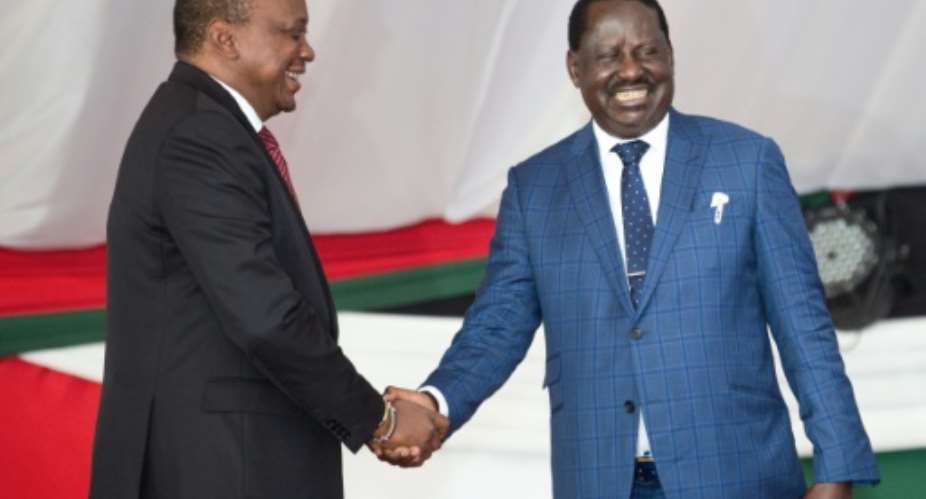A Kenyan taskforce has recommended the creation of posts for a prime minister and an official opposition leader, among wide-ranging reforms aimed at ending violent, divisive election cycles, according to a report seen by AFP Tuesday.
In a long-awaited report handed to President Uhuru Kenyatta and his former rival turned political ally Raila Odinga, a 14-member team unveiled the results of months of consultations with Kenyans across the country.
The Building Bridges Initiative (BBI) report came about after Kenyatta and Odinga in 2018 stunned the nation by shaking hands and pledging to promote unity after a drawn-out 2017 election battle left more than 90 dead.
"For almost 30 years, in Kenya, we spend two of every five years dealing with a slowing or declining economy due to fears of electoral crisis," read a summary of the report obtained by AFP, which is to be officially released Wednesday.
"Politicians... treat the election as a do-or-die affair, and Kenyans lives are endangered and even lost to violence. It takes a full year to recover economically from the election, and then we repeat the cycle all over again."
The country had barely moved on from the bruising poll when headlines swung to the 2022 election race and its potential alliances.
The report, which contains non-binding recommendations, suggests that president remain head of government and commander-in-chief while ministers would answer to the prime minister who the president would have the power to hire and fire.
It said that this structure would make the government "more accountable in Parliament and to the people."
Kenya briefly had the post of prime minister shortly before becoming a republic in 1964, and again in 2008 when the post was held by Odinga in a power-sharing government formed after a 2007 election sparked politically motivated ethnic violence that left over 1,100 dead.
The report also called for ways to strengthen a sense of national unity in the ethnically diverse nation.
These include celebrating a National Culture Day, and the commissioning of a "definitive, evolving, and inclusive official history."
The rapprochement between Odinga and Kenyatta has fuelled speculation the two are seeking a political alliance in 2022 -- with Kenyatta rumoured to be aiming for the prime ministerial post.
This has called into question Kenyatta's promise to his deputy William Ruto that he would back him in the next election.
Kenyatta, who is an ethnic Kikuyu, and Ruto, who is Kalenjin, struck a political alliance in 2013 as both were probed by the International Criminal Court (ICC) over the 2007 violence which pitted their communities against each other.





 We’ll protect state wealth from opaque deals – Prof Jane Naana
We’ll protect state wealth from opaque deals – Prof Jane Naana
 Mauritania president says running for second term in June polls
Mauritania president says running for second term in June polls
 I won't ever say I was a mere driver’s mate' — Prof. Opoku-Agyemang
I won't ever say I was a mere driver’s mate' — Prof. Opoku-Agyemang
 2024 polls: 'EC struggling to defend credibility'— Prof. Opoku-Agyemang
2024 polls: 'EC struggling to defend credibility'— Prof. Opoku-Agyemang
 Akufo-Addo gov't's 'greed, unbridled arrogance, unrestrained impunity, sheer dis...
Akufo-Addo gov't's 'greed, unbridled arrogance, unrestrained impunity, sheer dis...
 Election 2024: Ghana needs an urgent reset, a leadership that is inspiring – Ma...
Election 2024: Ghana needs an urgent reset, a leadership that is inspiring – Ma...
 Partner NDC to rollout a future of limitless prospects – Prof Jane Naana Opoku-A...
Partner NDC to rollout a future of limitless prospects – Prof Jane Naana Opoku-A...
 NPP will remain in gov’t till Jesus comes — Diana Asamoah
NPP will remain in gov’t till Jesus comes — Diana Asamoah
 Sunyani Technical University demands apology from former SRC president over sex-...
Sunyani Technical University demands apology from former SRC president over sex-...
 'Dumsor' was resolved by Mahama but ‘incompetent' Akufo-Addo has destroyed the g...
'Dumsor' was resolved by Mahama but ‘incompetent' Akufo-Addo has destroyed the g...
